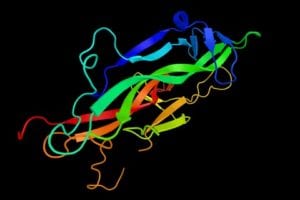Research Highlights Connection Between BDNF and Mesothelioma Survival
 French scientists say there is a clear connection between a biomarker called BDNF and mesothelioma survival. The research may open the door to improved mesothelioma diagnosis, prognosis, and treatment.
French scientists say there is a clear connection between a biomarker called BDNF and mesothelioma survival. The research may open the door to improved mesothelioma diagnosis, prognosis, and treatment.
BDNF stands for brain-derived neurotrophic factor. It is a protein found in the brain and other tissues.
In a new published study, researchers at the University of Nantes found that mesothelioma patients had higher BDNF levels than people with other cancers. Mesothelioma patients with the highest BDNF levels had the shortest mesothelioma survival.
Linking BDNF and Mesothelioma Survival
A biomarker is a substance that can be used to show the presence of disease. BDNF is a soluble mesothelioma biomarker. Soluble biomarkers are in body fluid and can be collected without a biopsy.
Not all mesothelioma biomarkers are soluble. Others are not present in all types of mesothelioma, as BDNF is.
The French study measured BDNF levels in both tissue and lung fluid. When they compared levels of BDNF and mesothelioma survival time, they found that patients with higher BDNF died earlier than other mesothelioma patients.
“Patients with high BDNF had a lower survival than patients with low BDNF (15.9 versus 21.1 months, p = 0.0736) and this survival difference is significant at 3 years,” writes lead study author Patrick Smeele.
BDNF may even impact how mesothelioma starts and spreads. “This association between high BDNF and poor survival suggests an implication of this protein in the development of the pathology,” writes Dr. Smeele.
How does BDNF Impact Mesothelioma Survival?
Researchers looked at the BDNF levels in 36 other types of cancer, too. Of all cancer types, pleural mesothelioma had the highest BDNF expression. The study calls high BDNF a “hallmark of MPM [malignant pleural mesothelioma].”
But the link between BDNF and mesothelioma survival is still not completely clear.
Research suggests that BDNF probably plays a role in the development of tumor blood vessels called angiogenesis. Angiogenesis is how mesothelioma tumors receive oxygen and nourishment.
But when the researchers treated mesothelioma cells in lung fluid (PE) with a BDNF-blocking drug, angiogenesis did not stop.
“The resistance of some PE to the blocking antibody demonstrates that BDNF is not the only player participating in this process,” writes Dr. Smeele.
Researchers say more studies on BDNF and mesothelioma survival may reveal new drug combinations for asbestos cancer.
Source:
Smeele, P, et al, “Brain-derived neurotrophic factor, a new soluble biomarker for malignant pleural mesothelioma involved in angiogenesis”, October 11, 2018, Molecular Cancer, https://molecular-cancer.biomedcentral.com/articles/10.1186/s12943-018-0891-0





